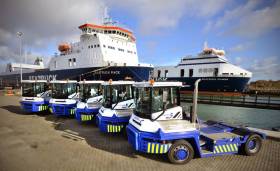Displaying items by tag: Further Capacity
Seatruck Further Increase Capacity on Dublin-Liverpool Service
#FerryNews - Irish sea freight operator, Seatruck Ferries have further increased capacity on their Dublin to Liverpool service. In addition sailing frequencies on the central Irish Sea corridor route.
The smallest vessel on the route the Clipper Ranger, has been replaced by a larger P series vessel, (Afloat identified as Clipper Pennant) offering almost twice the capacity. At the same time additional Friday sailings have been introduced meaning that Seatruck now operate 44 sailings per week on what is their busiest Irish Sea service.
The introduction of the larger Clipper Pennant is the next stage in Seatruck Ferries’ strategic development plan, with the company now operating 78 departures per week across 3 key routes on the Irish Sea.
Responding to customer feedback, departure times have also been tailored to reflect the changing needs of the Irish market. Seatruck currently move around 20% of the total Irish Sea roro freight volumes.
Driver shortages are causing many operators to reassess their traditional accompanied method. Seatruck Ferries believes in a switch to greater volumes of unaccompanied movements from ports, which reduces road mileage compared with the more traditional transit through Wales or Scotland. Trailer only shipments mean that Seatruck customers can use their drivers and equipment more efficiently.
This positive move will complement the existing Seatruck services operating from Dublin to Heysham and Warrenpoint to Heysham.
As Afloat previously covered, capacity on the Warrenpoint-Heyham route has just been increased by 30% with introduction of sisters Seatruck Performance and Seatruck Precision.
Alistair Eagles, Chief Executive of Seatruck Ferries said: “The recent vessel changes in Warrenpoint have allowed us to cascade additional modern tonnage onto our fast-growing Dublin – Liverpool route. The P series vessel is larger, faster and will improve schedule reliability in inclement weather.
He add "We are seeing unprecedented demand for unaccompanied trailer shipments across our network and with the driver shortage worsening we see this trend continuing. By switching to unaccompanied shipments our customers can ensure that they are using their resources in the most efficient way possible. The Dublin Liverpool route is now serviced by a modern fleet of purpose-built vessels offering unrivalled service for trailer operators with 4 midweek sailings per day in each direction.”
The vessel switch follows exponential growth for Seatruck in recent years with trailer volumes rising by more than 250% since 2007.





























































